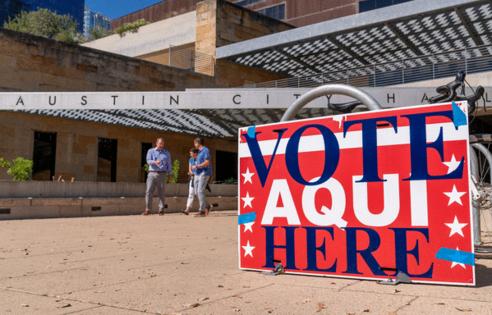Commentary: 4 challenges holding back democracy work
Published in Op Eds
The democracy field is asking itself hard questions about direction, strategy and impact. This summer, I’ve had one-on-one conversations with over 25 professionals across the space as I sought to answer these questions for myself.
These professionals spanned generations, political affiliations, and domains of work: civics education, institutional reform, philanthropy, international democracy support, and more. Across these conversations, recurring patterns emerged that seem worth sharing.
What follows are four common challenges I heard repeatedly, along with proposals for how the field might respond. These reflections are not exhaustive or rigidly prescriptive, but they draw on what I’ve heard recently and observed over six years working in this space.
1. The Field is Fragmented and Its Boundaries Are Unclear
The democracy field lacks coherence. Many organizations working on core democratic issues don’t identify with a shared “democracy space” at all. Some actively avoid the label for strategic or conceptual reasons. As a result, the self-identified democracy field is narrower than the broader ecosystem of nonprofits seeking to shape our democracy.
Within those boundaries, fragmentation is a major feature. Organizations often operate in silos, unaware of parallel efforts or reluctant to collaborate due to divergent theories of change. More deeply, the field seems to be experiencing a narrative vacuum. Many no longer believe we’ll return to a prior political equilibrium, but few have clear hypotheses for what comes next.
➔ Philanthropies Can Help Connect the Field
Funders are uniquely positioned to integrate the field. They have a bird’s-eye view and the ability to set expectations for collaboration. More forums for cross-organizational learning, investments in shared infrastructure, and articulating compelling visions of democratic renewal could benefit the entire space. These offerings should extend beyond current grantees to prospective partners and the public.
2. Financial Instability Is a Chronic Drag on Talent and Impact
Chronic underfunding weakens the sector. Organizations operate below their productive capacity, talented individuals patch together consulting contracts below market value, and many exit the field altogether due to financial pressure.
Grantmaking patterns often compound the problem: priorities appear to shift unpredictably, and opaque decision-making criteria leave nonprofits uncertain how to position their work.
➔ Nonprofits Can Tap Skilled Volunteers
When hiring isn’t feasible, nonprofits can still grow capacity by offering well-structured, meaningful roles to skilled volunteers. Political campaigns, faith communities, and grassroots organizations like Braver Angels know how to harness this kind of talent. Many professionalized nonprofits do not.
Imagine democracy organizations routinely engaging software engineers, management consultants, policy researchers, or retired nonprofit executives as volunteers. While this could not replace core staffing and requires investment in infrastructure, it’s a way the field could access far more talent than current budgets imply.
3. Short-Term Thinking Limits Long-Term Progress
The democracy field is often reactive. Funding and programmatic priorities seem to follow headlines more than sustained strategic thinking. This contributes to practitioner fatigue and skepticism about the durability of new investments.
Many practitioners argued that proactive democracy innovation remains underfunded relative to short-term democracy defense and general bridgebuilding. Catalyzing congressional capacity, piloting citizens’ assemblies, and developing pluralistic cultural narratives get short shrift relative to efforts designed to shore up the status quo. To borrow Julia Roig’s framework from the Horizons Project, most resources go to "blocking" rather than "building" efforts, despite the critical role that the latter will play in any stable democratic future.
➔ Make the Coordinated Case for Long-Term Reform
The field needs more coordinated advocacy for long-term solutions. Nonprofits driving institutional and cultural transformation could jointly articulate why their solutions matter through white papers, shared talking points, or joint donor outreach. They must show that their approaches can deliver near-term impact, when possible, and are rooted in a compelling theory of change. Otherwise, promising ideas may stay marginal.
4. Engagement with the Political Right Is Incoherent or Absent
Many organizations express interest in engaging Americans on the political right. But most democracy nonprofits are overwhelmingly left-leaning, predetermining both how they define problems and what solutions they promote. This often alienates conservatives, who suspect the language of democracy has been weaponized to delegitimize disagreement.
Current strategies often fail: expecting conservatives to endorse progressive priorities, signaling bipartisanship by including one or two right-of-center voices, or expressing open
hostility toward conservative Americans. Given that roughly half the country leans right, theories of change that ignore this reality are incomplete.
➔ Develop a Real Theory of Right-of-Center Engagement
Not every group needs to be bipartisan. But every organization’s strategy and vision should clearly account for the country’s political composition. For those seeking conservative engagement, this requires moving beyond tokenism toward authentic engagement with people who reflect the actual diversity of right-of-center thinking, including those who support Donald Trump.
This might mean hiring staff who speak credibly to right-wing audiences, developing programming that addresses conservative concerns, or creating governance structures that give right-of-center participants meaningful influence.
A Moment for Strategic Maturation
These observations are not final judgments. I’m still in listening mode. But the patterns are hard to ignore. Despite their frustrations, the professionals I spoke with remain deeply committed to improving democratic outcomes. That commitment, combined with growing bipartisan concern about the state of democracy, creates openings for a more coherent, durable, and strategically mature democracy ecosystem.
The question is whether the field’s leaders will use this moment to develop what it lacks or keep operating within the constraints of current patterns.
____
Andrew Doty is a political reform consultant whose clients have included Protect Democracy, the Rebuild Congress Initiative, and the Ronald Reagan Presidential Foundation & Institute. His experience spans policy analysis, campaign organizing, coalition building, and congressional outreach.
____
©2025 The Fulcrum. Visit at thefulcrum.us. Distributed by Tribune Content Agency, LLC.
























































Comments